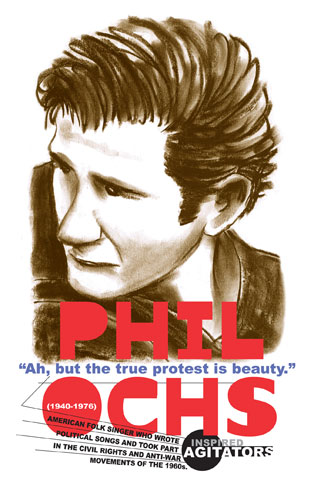 Every Saturday, we’ll be posting a new illustration by David Lester. The Mecca Normal guitarist is visually documenting people, places and events from his band’s 26-year run, with text by vocalist Jean Smith.
Every Saturday, we’ll be posting a new illustration by David Lester. The Mecca Normal guitarist is visually documenting people, places and events from his band’s 26-year run, with text by vocalist Jean Smith.
This week The Black Dot Museum of Political Art is asking performers at the inaugural Portland Folk Festival two questions:
1. Do you consider your lyrics to be part of a folk tradition of political songwriting?
2. Do you have other creative projects that you describe as political?
Jim Page is the Seattle-based writer of the hit song “Hiroshima Nagasaki Russian Roulette,” a cautionary tilt-a-whirl of a tale (power, militarism and glory) made famous by the Moving Hearts. Page’s lyrics, written in 1974, talk about the future, and that future is now:
“Our statesmen and leaders and politicians pay
Quick to heed the hand that feeds
They’re careful what they say
They call out experts to assure us
To wave their magic wands
This is the power of the future
And the future marches on
And they call in their favors
All their political gains
While the spills fill the rivers and settle in the plains.”
Jim Page answers the Black Dot Museum’s questions:
“Yes I do. I define ‘folk music’ as that music that comes from the community and returns to it. It doesn’t have to be played on guitars, fiddles and banjos. It doesn’t even have to be acoustic. But it needs to serve the community at the risk of falling out of favor with the main stream. Rap—back in the days when it passed from hand to hand through cassettes and ghetto blasters—was certainly folk music. As was punk. And I think that all folk music is inherently political. You can’t sing the beauties of the people without chafing against power, can you? Life is an act of rebellion.”
What’s my role in this? I’m going down a list of performers I’ve never heard of, sending out questions, after considering how to support a new folk festival. I’m not a folk-music fan, no one asked me to do this, and I’m not getting paid. This is actually my idea of fun! What I did instead of a summer vacation. I’m also not a fan of political art—or political music—per se. What I am a big fan of is coming up with ways to promote the activities of artists and musicians whose intention it is to instigate progressive social change. Magic markers, banjos—the tools aren’t as important as their intention to inspire.
Brian Cutean‘s email arrived next, at the end of a long day at work. He remembers Mecca Normal as a band from long ago. Fair enough.
Brian Cutean answers the Black Dot Museum’s questions:
“Music and lyrics have always been a part of the dialogue and necessarily includes poetry, literature, satire and folk songs (including rap, spoken word, etc.). Since I write in response to the world around me and came out of the culture of what Utah Phillips called ‘the Great Folk Scare,’ my work is part of the folk tradition even when it is stream of consciousness or oblique. The world’s ‘second oldest occupation’ is that of the bard, the troubadour and too, the storyteller standing in front of the cave fire passing on how public affairs of every time affect us all. I believe it was Brecht who said ‘art is not a mirror to reflect reality but a hammer with which to shape it.’ As an extension of that, expression itself affects other expressions as we inspire, confound and perplex each other.”
Brian signs-off saying, “I hope this helps, Jean. If there is anything else I can do, please let me know.” My god, who says stuff like that?
As old as the hills, folk music and the responses I am getting are sounding as weirdly fresh as hot lava busting out of a Hawaiian volcano. And what is folk music if not molten rock rolling over the countryside to form new land—yet again—tenaciously pushing out into the sea of possibility?






